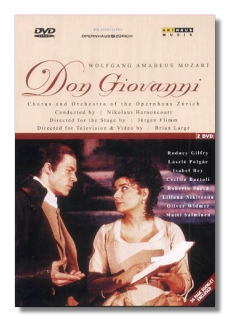
The Internet's Premier Classical Music Source
Related Links
- Mozart Reviews
- Latest Reviews
- More Reviews
-
By Composer
-
Collections
DVD & Blu-ray
Books
Concert Reviews
Articles/Interviews
Software
Audio
Search Amazon
Recommended Links
Site News
 DVD Review
DVD Review
Wolfgang Mozart

Don Giovanni
- Rodney Gilfrey (Don Giovanni)
- László Polgár (Leporello)
- Isabel Rey (Donna Anna)
- Cecilia Bartoli (Donna Elvira)
- Roberto Saccà (Don Ottavio)
- Liliana Nikiteanu (Zerlina)
- Oliver Widmer (Masetto)
- Matti Salminen (Commendatore)
Orchestra & Chorus of the Zürich Opera House/Nikolaus Harnoncourt
Arthaus Musik 100329 2DVDs: 187+min
The DVD era already has been good to Don Giovanni. Off the top of my head I can think of three alternatives, each with something valuable to offer. This probably is the weirdest of the four. (If Universal Classics transfers Sellars's Spanish Harlem version, all bets are off.) Nevertheless, it leaves you thinking, even if it also leaves you both scratching your head and shaking it.
Filmed live in Zürich's Opera House in the year 2001, this is one of those productions that doesn't want to be run of the mill, but that doesn't seem to have a coherent thesis to replace routine with. As a result there are lots of murky scrims and half-baked ideas. The entire second act takes places on and around something between scaffolding and a large jungle gym. Sometimes the characters are dressed in period style, but at other times the costuming is nondescript, to put it kindly. The lighting designer seems to want to hide the proceedings in darkness. Jürgen Flimm saves his theatrical coups for Act Two. Elvira's maid does a strip-tease from the window as Giovanni sings "Deh vieni alla finestra." After Giovanni is dragged off to hell (through what looks like an oversized barbeque grill), the remaining characters sing the opera's moral while sitting at the stage apron, primly and synchronously flipping through what looks like "Leporello's Little Red Book of Morality." At the end, they turn around to see Giovanni loving up Elvira's maid on top of the scaffolding. A car (a taxi?) is visible on the scrim, with other suggestions of 21st-century city life. Is the director saying that Don Giovannis are rife in the year 2001, or simply that hell might not be such a bad place after all? Innovations such as these are balanced by funny, commonsense touches, including Giovanni's prompting of Leporello during the latter's wooing of Elvira in Act II
The singers seem to have been chosen for vocal contrast, which is all well and good. Vocally and dramatically, Gilfrey, Polgár, and Bartoli are the stars of the show. Gilfrey is aristocratic, sexy, and not a little Mephistophelean, and his beautiful voice encompasses Giovanni's many tempers. It is not his fault if Harnoncourt insists on taking the "Champagne Aria" at an insane clip. As Leporello, Polgár is a sympathetic sad-sack, somewhat older than his master, mischievous, but intrinsically moral from the start. The dark coloring of his voice distinguishes him nicely from Gilfrey's much lighter Giovanni. Whenever she comes on stage, Bartoli dominates the proceedings. In fact, her Elvira is almost larger than life. She is every scorned yet faithful woman rolled into one. I don't know about Harnoncourt's decision to have her sing the end of "Ah, chi mi dice mai" through angrily clenched teeth, but she pulls it off. Her "Mi tradi," sung at a daringly slow tempo, is a show-stopper. Nikiteanu's warm-toned Zerlina is also enjoyable, and she has a sweet stage presence. Her Masetto, Oliver Widmer, complements her appealingly. On the debit side, Salminen's woolly Commendatore isn't terribly imposing, and Saccà's Ottavio, while creditably sung, just isn't very interesting, even if Harnoncourt allows him to ignore Mozart's notes and to shout for assistance for his fainting fiancé in the first scene. As Anna, Isabel Rey takes a long time to come to life. In her earlier scenes, her tone lacks focus, but by the time she reaches "Non mi dir," she's doing very well. As expected, Harnoncourt alternates between illuminating the score and infuriating the listener. It's not a dull conception of the score, by any means, but Harnoncourt's unpredictable tempos and fracturing of Mozart's phrases make this one of the most "interpreted" Don Giovanni s I know.
The disc changeover comes not between acts but after "Il mio tesoro." This was an unfortunate idea, although it might have been done to make room for the 24-minute "Behind the Scenes" documentary. The documentary includes brief interviews with Harnoncourt, Gilfrey, Bartoli, and Rey; Bartoli is pretty adorable, interjecting "Yes!" in the middle of her sentences the way Americans do with "uhs" and "ums."
I have no complaints about the quality of the sound and the picture. The former is available in LPCM Stereo and Dolby Digital 5.1 formats, and the latter is in the 16:9 format, leaving plenty of room for Italian, French, Spanish, English, or Japanese subtitles – or none at all, if you prefer.
This Don Giovanni is more than the sum of its parts. Although it takes a little while to warm up, you'll come away from it, in the words of Lorenz Hart, "bewitched, bothered, and bewildered."
Copyright © 2002, Raymond Tuttle




















